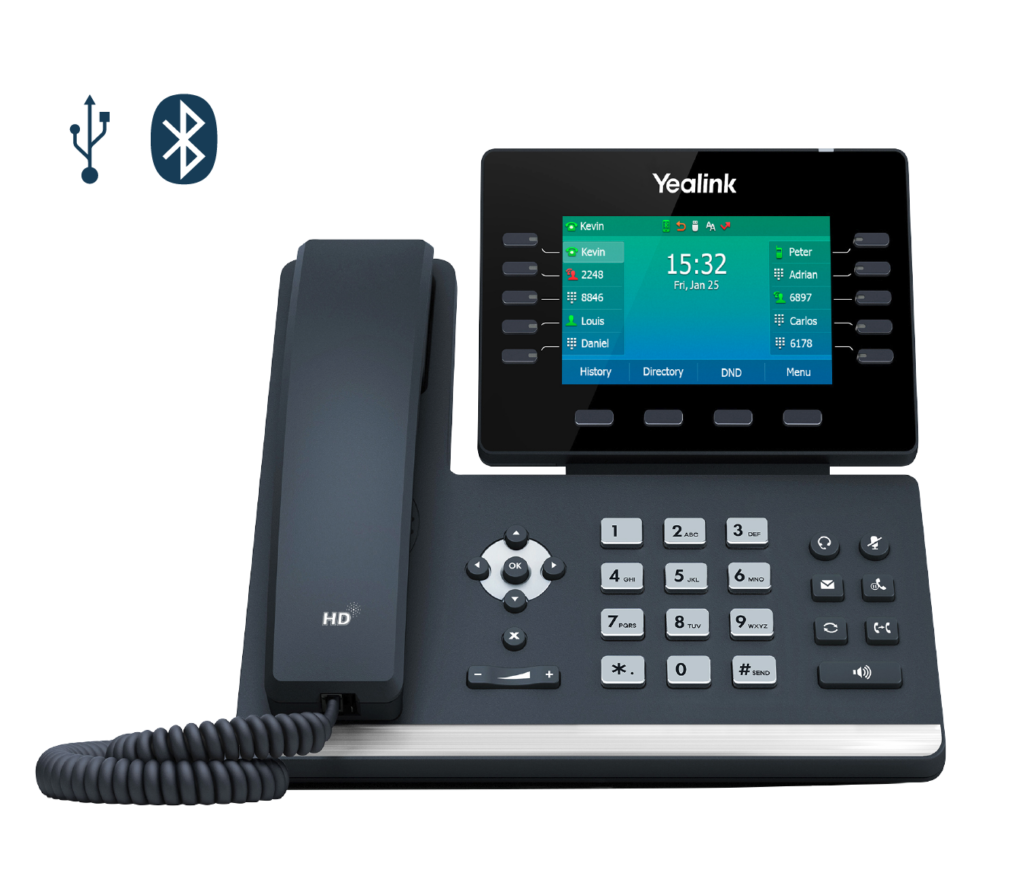
The benefits of VoIP
Super-fast | Reliable | Affordable
Whether you call it Hosted Voice, Hosted Telephony or VoIP (Voice Over Internet Protocol), internet-based call systems are becoming standard in many businesses.
What is VoIP?
VoIP stands for Voice over Internet Protocol and is nearly identical in operation to a traditional PBX, but rather than using onsite hardware, calls are routed via the internet. It’s ideal for supporting your remote or hybrid workforce, where staff can take calls as if they were sat at their desk in the office. All without costly call forwarding to mobile phones.
Technology has come a long way in the last few years but the needs of businesses have come a long way too. Needing to stay connected to colleagues and consumers at all times wherever you may be in the world, the ability to offer a respectful customer service and to build your businesses up are all ways in which the demands of a business has increased.
How does VoIP work?
To put it simply, instead of having phone lines and wires VoIP replaces them with an internet connection. Converting your voice into data when you speak and converting back to voice on the receiving end, crystal clear with no delay.
Okay, so we know how it works, but how well does it work? VoIP has a 99% uptime and if the small chance of some downtime, your mobile phone app will still allow you to make and receive calls. To top this off, VoIP problems can be fixed remotely within a matter of minutes meaning no expensive call out charges for an engineer to attend the site, getting you back running as usual in no time.
Ultimately the choice between VoIP or onsite will come down to your business needs, but in almost every case, hosted VoIP will be a good fit. Here’s why:
Lower cost per call
VoIP is best known for how cheap it is to make a call. Those low costs are due to the fact that VoIP uses your existing internet connection. This goes for international calls as well as domestic. The only new charge you have to think about is the monthly price of the hosted VoIP service you use, your team members are free to make as many calls as they want to, to each other. Compare this to traditional landlines that require hardware like wires, installation and expensive phone bills!

Work from anywhere
With hybrid working expected to become the new normal for working practices once ‘stay at home’ advice is relaxed, businesses need staff to be able to communicate wherever they are located.
A phone solution like VoIP will likely come with an app that allows you to make calls on your mobile phone, laptop, and even tablet. This means you can work from anywhere with an internet connection. That way, even if you cannot see colleagues and clients in person, your team can operate at full capacity and productivity levels, even if you’re not physically together. And in many cases team members will be able to keep a single number, regardless of travel or moving from one workspace to another, easy!
Scale it up as you grow
The number of people in your business can go up or down, but scaling up or down accordingly isn’t that easy with a regular telephone system. You have to purchase a handset or a dedicated physical line, which gets expensive. This often results in the need to use clumsy workarounds, like sharing phone sets between users.
With VoIP, scalability is not only easily available, but is also good for keeping your costs low. All you have to do is ask your service provider to add more lines when your team is increasing or remove a line when someone moves on. At any given point of time, you’ll only be paying for what you are currently using.
In other words, VoIP systems can grow comfortably alongside your business, no matter what your size.

“VoIP has transformed the way we can stay connected with out clients, anywhere at anytime.”
Packed with features
Calling is more fun with VoIP phone systems, because these phone systems are often accompanied by a variety of attractive features. Call waiting, call transferring, voice recognition, call forwarding, voicemail, caller ID, call blocking, automatic call distribution, etc. are just some of the many features that you may get to choose from, in your hosted VoIP service.
VoIP systems are feature-rich solutions that enable employees to operate as if they were in the office, even when they’re not. You can send voicemails to instant messaging or emails if the intended recipient isn’t available at the moment. It’s easy for organisations to centralise VoIP communication for better coordination. Other features include mobile integration, auto attendant, advanced call routing, conferencing, and call recording.

Integration with other softwares
Given the fact that VoIP is a technology based on the Internet, its integration with your normal business apps and software can be easily achieved.
You could combine VoIP with your email system, and be able to place calls through the email system itself or even with your CRM system, that way you can merge call records of a customer into the customer’s profile.
VoIP also works well with Microsoft Teams so that users can make and receive regular telephone calls either with their Teams app or with physical telephones.
You can schedule online meetings, chat to your co-workers and communicate easily between staff and customers. There are options to create a private or group chat whilst sharing files.
Increase productivity
The way VoIP works, the features it contains and the user friendliness of them allows for staff to become much more productive. Providing staff the ability to host virtual meetings, conduct international phone conferences at a small cost, attach important documents, share significant data through video conferencing and communicating with colleagues on a private chat software.
In recent years VoIP has really taken off quite significantly, especially in terms of voice clarity to the point that it can be clearer than your traditional phone line conversations. When VoIP first came to the market it was in need of some improvement: distorted calls, dropped calls and lagging transmissions to name a few. This is no longer the case and VoIP has now become one of the most popular ways of communication for businesses of all shapes and sizes.
Reliable and ready for ISDN switch off
In 2025, the UK’s ISDN network will be turned off. This means traditional telephone lines are being switched off, and more businesses will need to move to VoIP, so now is the time to set up your business with a digital phone line.
For a more in-depth overview about the 2025 switch off, what it means for your business, and whether to make the switch earlier with a possible cost saving, read our ISDN switch off page.
To find out more about how VoIP can transform your business, speak to one of our experts, contact us here.
